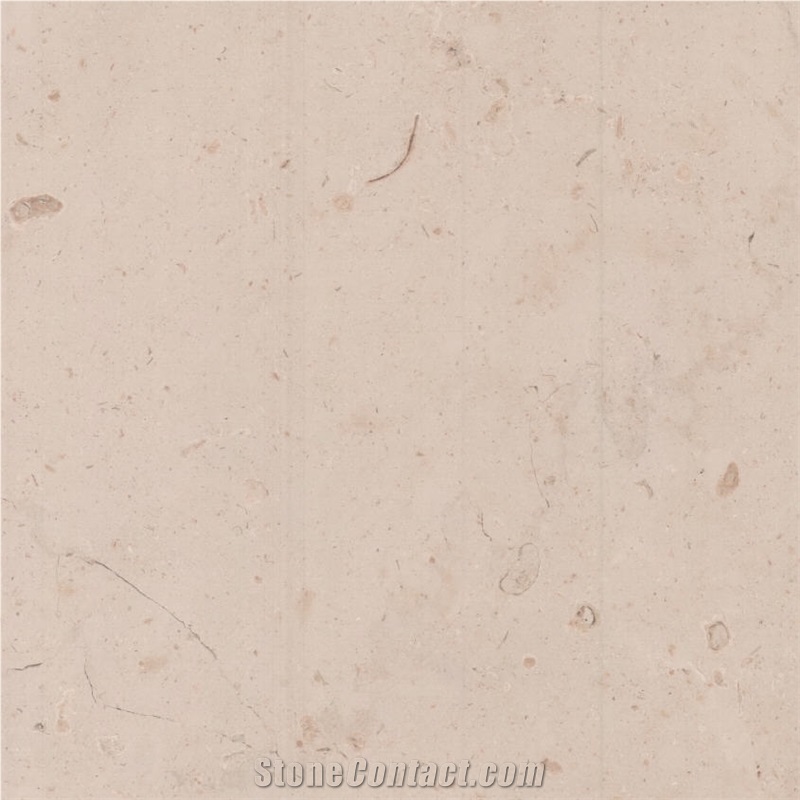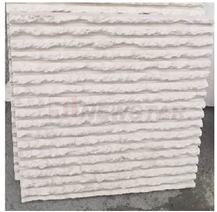Riyadh Stone
 Saudi Arabia
(Jabal Tuwayq, Riyadh)
Saudi Arabia
(Jabal Tuwayq, Riyadh)
Riyadh Stone, also known as Riyadh Limestone, is a natural stone commonly found in the Riyadh region of Saudi Arabia. It is a type of limestone that is highly valued for its durability, attractive appearance, and versatility in various construction and decorative applications.
Quarrying Riyadh Stone involves extracting large blocks or slabs of the limestone from quarries in the Riyadh area. The stone is formed over millions of years through the accumulation of marine organisms and sedimentation processes, resulting in a compact and solid composition.
Riyadh Stone exhibits a light beige to cream color, which is often characterized by subtle variations and patterns, including occasional fossilized remains. The stone's neutral tone allows it to complement a wide range of architectural styles and color schemes, making it a popular choice for both traditional and contemporary designs.
Due to its natural characteristics and aesthetic appeal, Riyadh Stone is utilized in numerous applications. It is commonly used for exterior cladding of buildings, including facades and walls, giving structures a timeless and elegant appearance. The stone is also used in interior applications such as flooring, wall cladding, and fireplace surrounds, adding warmth and texture to living spaces.
Riyadh Stone is highly regarded for its durability and weather resistance. It can withstand the harsh climatic conditions of the region, including extreme heat, sandstorms, and temperature fluctuations. The stone's density and strength make it resistant to wear, ensuring its longevity and minimal maintenance requirements.
One notable feature of Riyadh Stone is its ability to keep buildings cool in hot climates. Its light color reflects sunlight and reduces the absorption of heat, contributing to energy efficiency and thermal comfort in buildings.
The use of Riyadh Stone extends beyond residential and commercial projects. It is also employed in landscaping and outdoor design applications, including pathways, garden features, and decorative elements. Its natural beauty and durability make it an ideal choice for creating harmonious and visually appealing outdoor environments.
It is worth mentioning that Riyadh Stone may vary in appearance due to the natural characteristics of limestone. Color tones, patterns, and fossilized remains can differ from one piece to another. It is recommended to consult with suppliers and view samples to ensure that the specific Riyadh Stone selected aligns with the desired aesthetic and project requirements.
In summary, Riyadh Stone is a natural limestone quarried in the Riyadh region of Saudi Arabia. Its light beige to cream color, durability, and versatility make it a popular choice for various construction and decorative applications. With its timeless appearance and ability to withstand harsh climates, Riyadh Stone contributes to the aesthetic and functional aspects of architectural projects in the region.

What is the physical properties of Riyadh Stone?

How thick is Riyadh Stone wall cladding?

Is Saudi Arabia's Riyadh Stone Limestone an expensive stone?

Is Riyadh Stone good for garden planters?

Can Saudi Arabia's Riyadh Stone Limestone be used in a living room?

Is Riyadh Stone durable for use as urban pavement?

Can Saudi Arabia's Riyadh Stone Limestone be used in floor coverings?

Is Riyadh Stone resistant to heat?

Can Riyadh Stone be used in waterfall?

Does Riyadh Stone react to fire?

What is the disadvantage of Riyadh Stone wall cladding?

Can Saudi Arabia's Riyadh Stone Limestone be used exterior applications in very sunny climates?

Can Riyadh Stone be used for swimming pool pavement?

What is the disadvantage of Riyadh Stone floor cladding?

Is Riyadh Stone good for carving?

Can Riyadh Stone be used as bricks?

Can Riyadh Stone surface be polished finish?

Does Riyadh Stone absorb heat?

Can I use Riyadh Stone for fireplace design?

Is Riyadh Stone tile good for bathrooms?

How should I clean Riyadh Stone pool paving tiles and copings?

Is Riyadh Stone good for water features?

What is the coefficient of friction of Chiseled Saudi Arabia's Riyadh Stone Limestone tiles?

How should I clean Riyadh Stone wall tiles?

Can I use Riyadh Stone for garden steps?

How thick is Saudi Arabia's Riyadh Stone Limestone slabs?

Are there color variations of Saudi Arabia's Riyadh Stone Limestone?
 Fra****
Reviewed in Saudi Arabia on Apr 01,2024
Fra****
Reviewed in Saudi Arabia on Apr 01,2024
Hi I am a Cost Manager working as a Project management Consultant, As per our Client requirement We require natural stone for Building facade external cladding works, the quantity required is 19,000 sqm. We request quotations from your side for our projects based in Jeddah.
 Fra****
Reviewed in Saudi Arabia on Apr 01,2024
Fra****
Reviewed in Saudi Arabia on Apr 01,2024
Hi I am a Cost Manager working as a Project management Consultant, As per our Client requirement We require natural stone for Building facade external cladding works, the quantity required is 19,000 sqm. We request quotations from your side for our projects based in Jeddah.
 Mad****
Reviewed in Saudi Arabia on Nov 28,2023
Mad****
Reviewed in Saudi Arabia on Nov 28,2023
Could you please us on the Solar Reflectivity Index of Riyadh Stone. This is required for the LEED certification of our project
 Ros****
Reviewed in United Arab Emirates on Sep 11,2023
Ros****
Reviewed in United Arab Emirates on Sep 11,2023
Good Afternoon, I want to reach out regarding your natural Saudi Limestone. We are an architectural firm based in Dubai & Hong Kong with a number of high-end profile projects in North Saudi Arabia. Would you be able to supply further information on the natural stone available? Additionally, We would love the opportunity to see any samples. Look forward to hearing back. Ross Cochrane Architect 1ODesign
 Gul****
Reviewed in Saudi Arabia on Aug 17,2023
Gul****
Reviewed in Saudi Arabia on Aug 17,2023
Hi, We are working on a project in Riyadh wherein we intend to use riyadh limestone .but prior to that wanted to understand some properties of the lime stone for the purpose of LEED and Mostadam Certifications.We want to know the SRI value of the riyadh limestone.
 yam****
Reviewed in United States on Jun 13,2023
yam****
Reviewed in United States on Jun 13,2023
We have a museum project in Saudi. And would like to ask for a couple of sample for Riyadh Stone to understand the variation of colors and finishing available. How do we receive sample if we are based in New York?
 Rim****
Reviewed in Saudi Arabia on May 21,2023
Rim****
Reviewed in Saudi Arabia on May 21,2023
Hello, Hope my email finds you well. I want to ask if you have this option and a supplier in Riyadh City. White limestone tile with linear grooves, Size of tile, and thickness. Thank you
 By Visitor on Dec 24,2023
By Visitor on Dec 24,2023
Yes tell me
 By Ahmed Sami on Feb 22,2024
By Ahmed Sami on Feb 22,2024
Yes, at popular marble industries we are doing it in different stones. we can offer you matching stone to riyadh beige limestone. Please contact us at +923000652077
 Has****
Reviewed in United Kingdom on Apr 24,2023
Has****
Reviewed in United Kingdom on Apr 24,2023
Dear Sir/Madam, I hope you are well, My name is Hasan, I work at Foster + Partners in London. We’re currently studying various stone types for some landscaping, and floor finishes. Your products are very interesting to us and we would like to take a further look. I’m inquiring about the possibility of acquiring some samples – so that we can look at them in person. I have a detailed list of samples below that we would really love to get our hands on. I hope that this is possible, maybe around 150mm x 150mm. Crema Cenia Limestone Caliza Capri Moca Creme Gascogne Beige Limestone Vratza Limestone Jabal Tuwayq Stone Desert Beige Limestone Desert White Limestone Thank you so much, Looking forward to hearing back from you! Best, Hasan
 By Azam M Khan on Feb 29,2024
By Azam M Khan on Feb 29,2024
Good Morning Gents , We have our own processing facilities for Silica Gravels / Pebbles , Silica Sand , Silica Flour / Powder , Garnets , Other Decorative stones etc... in Saudi Arabia & Bahrain and we serve the whole GCC market...+96656 217 8181 / +973 3440 8181 : Azam Mohammad Khan : moulaintech@gmail.com
 Nad****
Reviewed in United Arab Emirates on Jan 31,2023
Nad****
Reviewed in United Arab Emirates on Jan 31,2023
Can you please direct us to a supplier that can provide us with samples? Honed samples and sealed samples? It will be used in Riyadh, but our office is in Dubai.
 By Ahmed Sami on Feb 22,2024
By Ahmed Sami on Feb 22,2024
We are Pakistan based stone supplier. We can offer you beige, white, gray and brown stone for your exterior cladding projects. Call / Whatsapp: +923000652077 Email: sales@popularmarble.com
-

-

 Saudi Arabia
Saudi Arabia
Contact Supplier
-

-

 Saudi Arabia
Saudi Arabia
Contact Supplier
-

-

 Pakistan
Pakistan
 10YRDiamond members are premium members on platform, providing members with comprehensive approach to promoting their products, increasing products exposure and investment return to maximize.
10YRDiamond members are premium members on platform, providing members with comprehensive approach to promoting their products, increasing products exposure and investment return to maximize.
Contact Supplier
-

 Pakistan
Pakistan
 10YRDiamond members are premium members on platform, providing members with comprehensive approach to promoting their products, increasing products exposure and investment return to maximize.
10YRDiamond members are premium members on platform, providing members with comprehensive approach to promoting their products, increasing products exposure and investment return to maximize.
Contact Supplier
-

-

-

 United Arab Emirates
United Arab Emirates
Contact Supplier
The request includes: 1. surface finished, size 2. quantity required
 Moh***Wrote:
Moh***Wrote:
I want to buy Riyadh Stone . Supply and installation of a natural stone, type of Riyadh stone, and all that is required for implementation, according to specifications, plans, and instructions of the supervising engineer, after obtaining approval of the owner (Riyadh Airports Company). Natural stone type of Riyadh Stone is a Beige Limestone from Saudi Arabia. Will be used as identified on the pedestrian as marked in the design drawing of landscape. The materials should be from the source to give Compressive Strength between: 180.0 - 185.0 MPa, and Density: 2090 kg/m³, and Flexural Strength: 55.0 - 60.0 MPa. the natural stone masses with shape design should be installed on table surface and stone pieces should prepared into pieces with different sizes or masses to give natural view on the roundabout as described in the design drawing, and supervisor approval. Supply and installation of River Stone and all and all related materials in accordance to the terms and technical specifications and instructions of the supervising engineer and after obtaining approval of the owner (Riyadh Airports Company) which includes all surface preparation and agents for fixing the stones. This materials should be compatible to be Multicolor River Stone or Pebble Stone, Cobble Stone, and should be fixed on identified areas in the roundabout landscaping design drawing, and the stones should be Natural Polished Mixed Color Stones from the river origin with different size ranging from 2-7 cm. it should be environmental friendly material, no radiation, and non-toxic.
 Reb***Wrote:
Reb***Wrote:
I would like a sample of Riyadh Stone - 1x honed finish, and 1x brushed finish. Size to be 100mm x 100mm Can a sample be sent to the UK?
 Vas***Wrote:
Vas***Wrote:
I want to buy Riyadh Stone 4875m2 to UAE







